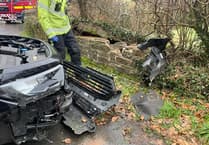The Bishop has been visiting all 12 Deaneries in the Diocese as part of a concerted 'getting to know you' pilgrimage across the whole of Cornwall, and his visit to the most northern part of the Diocese — furthest from Truro — was largely organised by the Rural Dean, the Revd Canon Rob Dickenson.
Bishop Tim was enthusiastic about his day "We went right up to Morwenstow," he said, "where I had a chance to see St Mark's Church of England School, which was marvellous, and to do something of a pilgrimage to Parson Hawker's patch. So we went out to the cliffs there, and the weather was good, so I got some idea of the north coast at its springtime best."
The Bishop also visited St Anne's Retirement home at Whitstone, which he said made a great impression for its welcome and its sheer homeliness.
"It is really unusual to go to a retirement home and be met by the smell of baking scones, and it was very clear that there was a very high standard of care and concern for all those living there."
The Bishop lunched with the clergy of the Deanery and in the evening attended a short service of welcome devised by the Revd Peter Judson, and held at St Michael's, Bude.
Over 100 people turned out to welcome Bishop Tim, and the informal service included elements from the welcome service at Truro Cathedral earlier in the month.
The service included an inspiring address by the Bishop, in which he challenged church people to move out of their comfort zones, and engage more with the world.
"We have much to offer, but we must not spend all our time simply doing the same familiar things, without questioning why we do them," he said. "Sometimes we hear that our services are boring, and if we are honest, they probably are! So we need to consider the activity of the church outside the church building, and do more to engage with people, so that we can learn what it is that would attract them to the faith which drives our lives."
Following the Bishop's address, there were greetings from representatives of a number of local communities, faith groups and organisations, and finally, for about an hour, the Bishop answered questions submitted by those present.
Bishop Tim said: "On this occasion people could write down their questions, so there was degree of anonymity about it, and I think that helped, because people were very forthright about some of the things they asked."
Subjects included the Bishop's own calling to the priesthood (he had known from the age of 16 that he wanted to be a priest), the importance of Christian witness, the recession and its effect on the Church.
"Money is going to be tight for all of us, and this applies particularly to charities and voluntary organisations," said the Bishop, "and we need to ask ourselves hard questions about some of the things which perhaps we may have been doing for years. Why do we do this? Is it effective? What is its purpose? Does what we are doing draw people to an understanding of God at work in the world?"
The Bishop said he was very encouraged by what he had seen of the life of the deanery, and added: "In many ways I think that units of this size have much to teach us about the best way of working in rural communities, and I shall certainly be back to find out more about many of the good things going on here."




Comments
This article has no comments yet. Be the first to leave a comment.